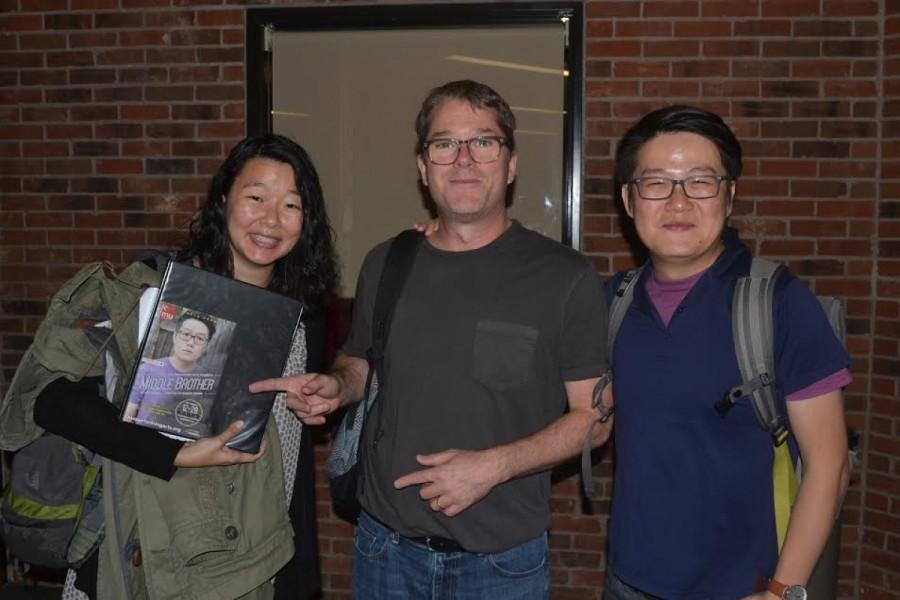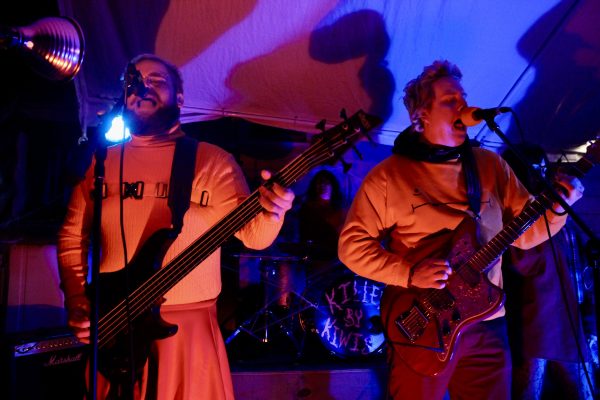Fighting prejudice through theatre
Local theater troupe Mu Performing Arts’ mission is to portray Asian Americans realistically.
(Left to right): Mu Performing Arts Marketing Coordinator Sara Ochs (holding Middle Brother program, the show Mu Performing Arts ran from Sept. 12 – Sept. 28), Hamline University Professor Jeff Turner and Mu Performing Arts Development Director Eric Sharp.
October 1, 2014
Mu Performing Arts Marketing Coordinator Eric Sharp and Development Director Sara Ochs shared their company’s vision and even performed excerpts of Middle Brother for Hamline professor Jeff Turner’s Introduction to Theater Arts: Stage and Screen course on Tuesday, Sept. 23.
“It was also nice to see the cast, especially after I went to go see the show [Middle Brother],” first-year Robby Miller said.
Based in downtown St. Paul, Mu Performing Arts is the largest Asian American theatre company in the Midwest. Sharp said the Twin Cities is more diverse than most people think. He cited how Minnesota has the highest concentration when it comes to Korean adoptees, the nation’s second largest Hmong population and the largest Somali population outside of Somalia.
Mu Performing Arts mission statement is as follows: “Mu produces great performances born of arts, equality, and justice from the heart of the Asian American experience.”
Part of their presentation was about showing how much stereotypes play a part of image association.
One activity done to show this was when Sharp and Ochs had the students draw a person representing a nationality in thirty seconds. After the activity, they opened up a discussion for the class to talk about what was drawn. Sharp drew a stick person on the board and rhetorically asked why don’t all the nationalities look like this?
“I really enjoyed the way they were really honest,” Turner said. “They were really asking everyone to be honest to what they know, what they think or what their assumptions are and not to judge but to say ‘okay, this is what we are and this is how it ties into the mission of the theatre company.’”
Sharp explained in their productions they play roles that represent true Asian American stories, not stereotypes.
“We want to see our stories being represented when it’s not a punchline,” Sharp said.
Ochs explained their reasoning.
“Mu is here to change the lens to get past the stereotypes,” Ochs said. “We tell Asian American stories from all kinds of walks of life. … Part of our mission is to get the adoptee narrative [out there].”
One of the requirements of Turner’s Introduction to Theatre Arts course is to have students attend four assigned theater events. One of the assigned plays is Middle Brother, a Mu Performing Arts production Sharp has written and performs the lead role.
The play is about a 28-year-old Korean adoptee named Billy who decides to purchase a one way ticket to his home country.
Turner said he heard about the play from Ochs, whom he met in the fall of 2012, when he was the dramaturgy of a musical presented by Theater Latte` Da. Ochs was part of the ensemble for that production and the two have kept in touch via Facebook.
Turner said when he heard about Middle Brother, he instantly thought it would be something he wanted his class to go see and assigned it on the syllabus.
“On Facebook I said ‘hey, I’m making my students go see Middle Brother,’ and [Ochs] is like ‘oh, excellent. Can we come visit your classroom?’ And I was like ‘yeah, absolutely. Come visit my classroom,’” Turner said.
First-year Shelby St-Pierre said it was a valuable learning experience. As a Minnesota native, she said it was interesting to hear for the first time how Minnesota has the highest Korean adoption concentration in the nation.
St-Pierre also enjoyed listening to the speakers’ personal motivation behind working at Mu Performing Arts.
“I thought it was nice that they told us about the company,” she said. “They just explained what they do and why it’s important to them.”
Miller elaborated.
“I just liked the experience…to be able to ask questions and to interact with theatre troupes,” Miller said. “It’s just an interesting thing in general and I really liked the fact that Hamline was able to bring ‘A’ theatre troupes so that we could learn.”





